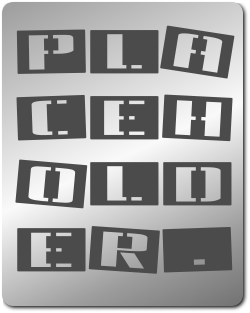Fluprothixene
A detailed overview of the antipsychotic medication Fluprothixene
Fluprothixene is a typical antipsychotic medication belonging to the thioxanthene class. It is primarily used in the treatment of schizophrenia and other psychotic disorders. Fluprothixene is known for its efficacy in managing symptoms such as delusions, hallucinations, and thought disorders.
Pharmacology[edit]
Fluprothixene acts as an antagonist at various neurotransmitter receptors in the brain, including the dopamine D2 receptors. This action is believed to be responsible for its antipsychotic effects. By blocking dopamine receptors, fluprothixene helps to reduce the overactivity of dopamine pathways that are often associated with psychotic symptoms.
Mechanism of Action[edit]
The primary mechanism of action of fluprothixene involves the blockade of dopamine D2 receptors in the central nervous system. This blockade reduces the positive symptoms of schizophrenia, such as hallucinations and delusions. Additionally, fluprothixene may have some affinity for serotonin receptors, which could contribute to its therapeutic effects.
Pharmacokinetics[edit]
Fluprothixene is administered orally and is absorbed through the gastrointestinal tract. It undergoes hepatic metabolism and is excreted primarily in the urine. The half-life of fluprothixene allows for once or twice daily dosing, depending on the formulation and clinical requirements.
Clinical Use[edit]
Fluprothixene is indicated for the treatment of schizophrenia and other psychotic disorders. It may be used in both acute and chronic phases of these conditions. The medication is typically prescribed when other antipsychotics are not effective or cause intolerable side effects.
Dosage and Administration[edit]
The dosage of fluprothixene varies depending on the severity of the condition being treated and the individual patient's response. It is important to start with a low dose and gradually increase it to minimize side effects. The medication is available in tablet form and should be taken as prescribed by a healthcare professional.
Side Effects[edit]
Common side effects of fluprothixene include sedation, dry mouth, constipation, and orthostatic hypotension. Like other typical antipsychotics, it can also cause extrapyramidal symptoms such as tardive dyskinesia, akathisia, and parkinsonism. Long-term use may lead to metabolic changes and weight gain.
Contraindications and Precautions[edit]
Fluprothixene is contraindicated in patients with known hypersensitivity to thioxanthenes. Caution is advised in patients with a history of cardiovascular disease, seizure disorders, or liver impairment. Regular monitoring of blood counts and liver function tests is recommended during treatment.
History[edit]
Fluprothixene was developed in the mid-20th century as part of the search for effective antipsychotic medications. It was introduced to the market following clinical trials that demonstrated its efficacy in managing psychotic symptoms.
Also see[edit]
Ad. Transform your life with W8MD's Budget GLP-1 injections from $75


W8MD offers a medical weight loss program to lose weight in Philadelphia. Our physician-supervised medical weight loss provides:
- Weight loss injections in NYC (generic and brand names):
- Zepbound / Mounjaro, Wegovy / Ozempic, Saxenda
- Most insurances accepted or discounted self-pay rates. We will obtain insurance prior authorizations if needed.
- Generic GLP1 weight loss injections from $75 for the starting dose.
- Also offer prescription weight loss medications including Phentermine, Qsymia, Diethylpropion, Contrave etc.
NYC weight loss doctor appointmentsNYC weight loss doctor appointments
Start your NYC weight loss journey today at our NYC medical weight loss and Philadelphia medical weight loss clinics.
- Call 718-946-5500 to lose weight in NYC or for medical weight loss in Philadelphia 215-676-2334.
- Tags:NYC medical weight loss, Philadelphia lose weight Zepbound NYC, Budget GLP1 weight loss injections, Wegovy Philadelphia, Wegovy NYC, Philadelphia medical weight loss, Brookly weight loss and Wegovy NYC
|
WikiMD's Wellness Encyclopedia |
| Let Food Be Thy Medicine Medicine Thy Food - Hippocrates |
Medical Disclaimer: WikiMD is not a substitute for professional medical advice. The information on WikiMD is provided as an information resource only, may be incorrect, outdated or misleading, and is not to be used or relied on for any diagnostic or treatment purposes. Please consult your health care provider before making any healthcare decisions or for guidance about a specific medical condition. WikiMD expressly disclaims responsibility, and shall have no liability, for any damages, loss, injury, or liability whatsoever suffered as a result of your reliance on the information contained in this site. By visiting this site you agree to the foregoing terms and conditions, which may from time to time be changed or supplemented by WikiMD. If you do not agree to the foregoing terms and conditions, you should not enter or use this site. See full disclaimer.
Credits:Most images are courtesy of Wikimedia commons, and templates, categories Wikipedia, licensed under CC BY SA or similar.
Translate this page: - East Asian
中文,
日本,
한국어,
South Asian
हिन्दी,
தமிழ்,
తెలుగు,
Urdu,
ಕನ್ನಡ,
Southeast Asian
Indonesian,
Vietnamese,
Thai,
မြန်မာဘာသာ,
বাংলা
European
español,
Deutsch,
français,
Greek,
português do Brasil,
polski,
română,
русский,
Nederlands,
norsk,
svenska,
suomi,
Italian
Middle Eastern & African
عربى,
Turkish,
Persian,
Hebrew,
Afrikaans,
isiZulu,
Kiswahili,
Other
Bulgarian,
Hungarian,
Czech,
Swedish,
മലയാളം,
मराठी,
ਪੰਜਾਬੀ,
ગુજરાતી,
Portuguese,
Ukrainian
